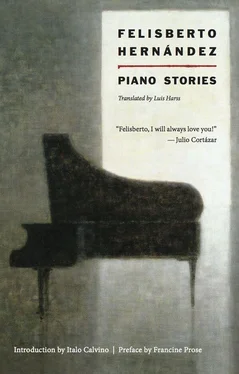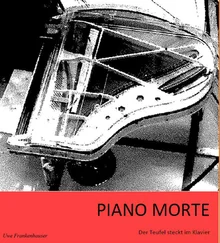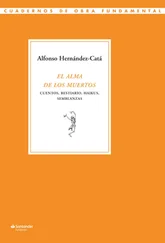Felisberto Hernandez - Piano Stories
Здесь есть возможность читать онлайн «Felisberto Hernandez - Piano Stories» весь текст электронной книги совершенно бесплатно (целиком полную версию без сокращений). В некоторых случаях можно слушать аудио, скачать через торрент в формате fb2 и присутствует краткое содержание. Год выпуска: 2014, Издательство: New Directions, Жанр: Современная проза, на английском языке. Описание произведения, (предисловие) а так же отзывы посетителей доступны на портале библиотеки ЛибКат.
- Название:Piano Stories
- Автор:
- Издательство:New Directions
- Жанр:
- Год:2014
- ISBN:нет данных
- Рейтинг книги:4 / 5. Голосов: 1
-
Избранное:Добавить в избранное
- Отзывы:
-
Ваша оценка:
- 80
- 1
- 2
- 3
- 4
- 5
Piano Stories: краткое содержание, описание и аннотация
Предлагаем к чтению аннотацию, описание, краткое содержание или предисловие (зависит от того, что написал сам автор книги «Piano Stories»). Если вы не нашли необходимую информацию о книге — напишите в комментариях, мы постараемся отыскать её.
Piano Stories
Piano Stories — читать онлайн бесплатно полную книгу (весь текст) целиком
Ниже представлен текст книги, разбитый по страницам. Система сохранения места последней прочитанной страницы, позволяет с удобством читать онлайн бесплатно книгу «Piano Stories», без необходимости каждый раз заново искать на чём Вы остановились. Поставьте закладку, и сможете в любой момент перейти на страницу, на которой закончили чтение.
Интервал:
Закладка:
One evening, just before dark, I had the sudden feeling Miss Margaret’s husband might be buried on the island: that would have explained why she made me circle it endlessly and then got me up in the middle of the night — on moonlit nights — to circle it a few more times. Yet her husband couldn’t be on the island: according to Hector, her niece’s boyfriend, she had lost him over a cliff in Switzerland. I also recalled what the boatman had told me the night I arrived in the flooded house, while rowing me slowly up “the water avenue,” which was as wide as a street and bordered by plane trees with hanging seed balls. One of the things I had learned from him was that he and a handyman had filled in the courtyard fountain to turn it into an island. It also seemed to me that the motions of Miss Margaret’s head — on the afternoons when her eyes went from her book to the island and back to the book again — bore no relation to a dead man hidden under the plants. On the other hand, once when she had looked me full in the face, I’d had the impression that her thick lenses taught her eyes to dissemble, and that the great glass dome over the courtyard containing the small island was meant to enclose the silence of the dead.
Then I remembered the glass walls and dome had been built before her time — and it was good to know that the house, like a human being, had performed different functions through the years. First it had been a country house, then an observatory, until the telescope that had been ordered from the United States was sunk to the bottom of the sea by the Germans, after which the courtyard had been made into a winter garden, and finally Miss Margaret had bought the house in order to flood it.
Now, while our boat circled the island, I enveloped her in suspicions that never seemed to fit her. But the enormity of her body in its naked surroundings tempted me to imagine a dark past for it. At night, wrapped in silence, it seemed even more immense, like a sleeping elephant, and sometimes she made a strange sound in her throat, like a hoarse sigh.
I had started to grow fond of her because, since being abruptly transplanted by her generosity from penury to my current opulence, I had been enjoying a lazy well-being, and because she lent herself — as a white elephant might lend its back to a traveler — to absurd imaginings. She also had a way — although she never questioned me about my life — of raising her brows when we met as if they were about to fly off, and then her eyes, behind their thick lenses, would seem to be asking, “What is it, my boy?”
So, gradually, my feelings for her had become illusions — and if I let my memory roam free now, it’s this first Miss Margaret who comes to mind, because the second one, the real one I got to know when she told me her story toward the end of the season, managed to remain strangely inaccessible to me.
But now I must force myself to begin the story at the real beginning and not linger too long over the preferences of memory.
I was very weak one day in Buenos Aires when I ran into Hector. He invited me to a wedding and stuffed me with food. During the ceremony he thought of a job for me: choking with laughter, he told me about a “dotty dowager” who could help me. She was a generous soul, he said, adding that she’d had a house flooded by means of a system devised by a Seville architect, who had previously flooded a house for a rich Arab determined to make up for the desert. Shortly afterward, Hector visited Miss Margaret with his girlfriend, told her about my books, and recommended me as a “fellow sleepwalker.” She immediately contributed some money and offered to invite me to the flooded house the next summer, if I knew how to row. For some reason Hector postponed taking me to meet her, then she fell ill. She was still recovering when Hector and his girl joined her that summer. For the first few days the house was dry, but when the water had been let in they sent for me. I took a train out to a small town, from which I reached the house by car. The area seemed barren to me, but when night came I felt there might be trees hidden in the dark. The driver left me with my suitcases on a small pier at the entrance to the canal — the “water avenue.” He rang a bell that hung from a plane tree. But the pale light of the boat had already broken away from the light of the house — I could see a bright dome and next to it a dark monster as tall as the dome: it was the water tower — and was coming toward me. By the pale light the boat was a greenish color. It brought a man in white who started talking before he had reached me and kept up his conversation all the way back to the house (he was the one who told me about the fountain having been filled in with earth). Suddenly the light of the dome went out. At that moment the boatman was saying, “She won’t have any papers or junk thrown in the water. It’s her floor and she wants it kept clean. There’s no door to shut the dining room off from the bedroom. One morning when the lady woke up early she saw a loaf of bread that my wife had dropped come swimming toward her from the dining room. She was so angry she fired my wife on the spot. She said there was nothing uglier in the world than a piece of bread swimming by.”
The front of the house was smothered in vines. We reached a wide entrance hall lit with a yellowish glow. From there I could see part of the great watery courtyard and its island. The water flowed into a room on the left, under a closed door. The boatman tied the boat to a large bronze frog mounted on the walk to the right, and we got off on that side and carried my suitcases up a concrete staircase. On the second floor was a corridor with glass windows that had steamed up in the smoke from a huge kitchen. There I was met by a dumpy woman. She wore her hair in a bun with flowers and looked Spanish. She said the lady, her mistress, would not receive me until the next day, but that she would call me on the phone later that night.
The bulky, dark furniture in my room seemed uncomfortable between the white walls assaulted by the raw light of a single clear bulb that hung naked in the middle of the room. The Spanish maid lifted a suitcase and was surprised at its weight. I said it was full of books, and she began to tell me about how it was “too many books” that had ruined her lady’s health “and even made her deaf — and then she expects us not to shout at her.” I must have done something to show the light was hurting my eyes and she said:
“The light bother you? It bothers her, too.”
I lit a table lamp with a green shade that I thought would give out a pleasant glow. Just then a phone behind the lamp rang and the Spanish maid answered it. She kept saying “yes” over and over, the white flowers in her bun quivering each time she nodded. Then she seemed to be holding back the words that reached her lips in short breaths and syllables. Finally, with a sigh, she hung up and left in silence.
I ate well and drank good wine. The Spanish maid kept talking to me, but I was worrying about what would become of me in that house, and only nodded at her now and then, dipping my head like a piece of heavy furniture on a weak floor. With my coffee, I lit a cigarette, and when she picked up the empty cup, reaching through the smoky light, she told me again that the lady would call me on the phone. I kept staring at the receiver, expecting the ring at any moment, but it still took me by surprise. Miss Margaret asked me about my trip and whether it had been very tiring. She spoke in a faint but pleasant voice. I made my answer loud and clear, pronouncing each word distinctly.
“You can speak naturally,” she said. “I’ll explain later why I’ve told Mary I’m deaf. I’d like you to feel at home here — you’re my guest. All I’ll ask of you is to row my boat and endure something I have to tell you. In exchange I’ll be happy to contribute monthly to your savings, and I’ll try to be useful to you. I’ve read your stories as you published them. I didn’t want to discuss them with Hector so as not to get into an argument — I’m very impressionable. But we’ll have a chance to talk soon. .”
Читать дальшеИнтервал:
Закладка:
Похожие книги на «Piano Stories»
Представляем Вашему вниманию похожие книги на «Piano Stories» списком для выбора. Мы отобрали схожую по названию и смыслу литературу в надежде предоставить читателям больше вариантов отыскать новые, интересные, ещё непрочитанные произведения.
Обсуждение, отзывы о книге «Piano Stories» и просто собственные мнения читателей. Оставьте ваши комментарии, напишите, что Вы думаете о произведении, его смысле или главных героях. Укажите что конкретно понравилось, а что нет, и почему Вы так считаете.












